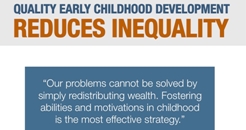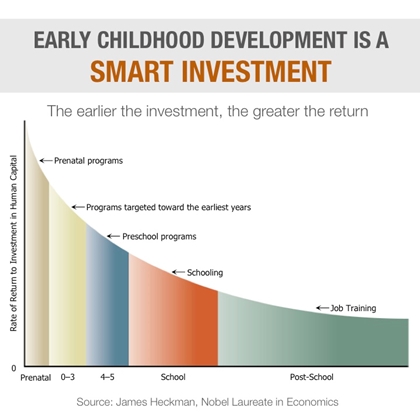 The Heckman Equation
The Heckman Equation
James Heckman is a Professor of Economics at the University of Chicago, a Nobel Memorial Prize winner in economics and an expert in the economics of human development.
Through the university’s Center for the Economics of Human Development, he has conducted groundbreaking work with a consortium of economists, developmental psychologists, sociologists, statisticians and neuroscientists showing that quality early childhood development heavily influences health, economic and social outcomes for individuals and society at large. Heckman has shown that there are great economic gains to be had by investing in early childhood development.
1. Intelligence and social skills are developed at an early age — and both are essential for success.
Many major economic and social problems — crime, teenage pregnancy, high school dropout rate, adverse health conditions — can be traced to low levels of skills and social abilities such as attentiveness, persistence and working with others.
These so-called “soft” social skills are neither soft nor unimportant. Professor Heckman found hard evidence that these capabilities are essential ingredients for success in life. Lifecycle skill formation is dynamic in nature. Skill begets skill; motivation begets motivation. In fact, early development of effective social skills greatly influence the successful development of the IQ and ultimately, personal and social productivity.
2. Early investment produces the greatest returns in human capital.
Professor Heckman found that early nurturing, learning experiences and physical health from ages zero to five greatly impact success or failure in society. The most economically efficient time to develop skills and social abilities is in the very early years when developmental support is most effective.
Today’s challenges are real — rates of school exclusions, increasing rates of obesity and chronic diseases, crime, etc. Professor Heckman’s work proves that prevention through early childhood development is more life- and cost-effective than remediation. We need to invest in upstream solutions for future generations while we continue to address today’s problems.
3. A country’s advantage will come from helping the disadvantaged.
Professor Heckman shows that disadvantaged families are least likely to have the economic and social resources to provide the successful early developmental stimulation every child needs as a basic opportunity for future success in school, further education, career and life. Poor health, school dropouts, poverty, crime — any country will continue to create costly economic and social burdens if it fails to provide disadvantaged families with the resources they need for effective early childhood development.
Providing developmental resources pays dividends for the disadvantaged child and society as a whole by providing better education, health and economic outcomes.
4. Quality economic returns come from quality investments in early childhood development.
Professor Heckman studied decades’ worth of data from early childhood development programs that gave disadvantaged children and their families developmental support. This form of comprehensive early childhood development provides children and their families with the resources for early nurturing, learning experiences and physical health that lead to future success, breaking the cycle of disadvantage.
Professor Heckman’s economic analysis of these programs reveals that investing in early childhood development for disadvantaged children provides a great return to society through increased personal achievement and social productivity.
See a chart of his findings:

Read more about his research here.
Retweet about this article:
From research by Professor James Heckman, 26/09/2018